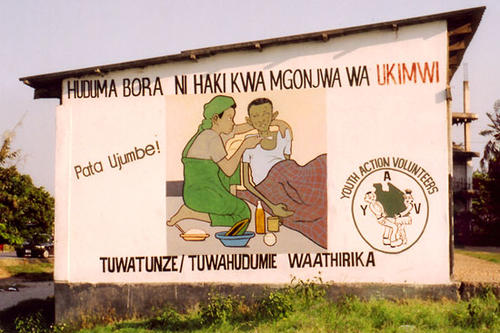Other Countries, Other Methods
Newly Established Medical Anthropology Thematic Cluster at Freie Universität
Jun 25, 2010
Murals serving as campaign posters thematize nursing home care in urban areas of Tanzania.
Image Credit: Hansjörg Dilger
How are people living with HIV/AIDS treated in Tanzania? What does being sick mean for illegal immigrants in Germany? How do Chinese women living in Berlin experience pregnancy? The field of medical anthropology explores questions like these. At the Institute of Social and Cultural Anthropology of Freie Universität, a thematic cluster has been established specifically for this field. The cluster made its first public appearance during the Long Night of the Sciences held on June 5.
Researchers within the Medical Anthropology Thematic Cluster take a global, social, and cultural anthropology approach to the study of phenomena associated with illness, health, and curative processes. For example, they examine why certain measures aimed at preventing the spread of HIV/AIDS have not caught on in African societies. Their findings can serve as a kind of cultural guide, significantly shortening the paths taken by medical professionals as they strive to find solutions.
Specific Cultural Features, Viewed in a Global Context
“The strength of social and cultural anthropology by comparison to other cultural and social sciences is that due to the methods used, this discipline gives us detailed insight into other ways of life and is able to explain them,” says Professor Hansjörg Dilger, head of the thematic cluster. That means that in the ideal case, social and cultural anthropology can point to new approaches toward solving present-day problems. While classical cultural anthropology, sometimes also called ethnology, studied primarily “traditional” non-European cultures, researchers in social and cultural anthropology today explore not only issues in cultural history, but increasingly also current cultural, social, and political connections – and they do so in a global context. Popular areas of research within the field include business and economics and medicine.
In the United States and the United Kingdom, medical anthropology is one of the strongest areas of research within the field of social and cultural anthropology. In the German-speaking countries, by contrast, medical anthropology has only become established as an independent subdiscipline within the field in the past few years. The specific, globally oriented thematic cluster within an institute of social and cultural anthropology that has now been established at Freie Universität is the first of its kind at a German higher education institution.
Research on Current Social Issues
“We do fundamental research, but we also select the areas of focus for our research based on real-world practice, and we try to develop theoretical access routes and connections,” Dilger says. The researchers within the thematic cluster take on two different perspectives as they do so: First, they study the concepts, practices, and institutions relating to medicine and health in “non-Western” societies, particularly in Africa and Asia. At the same time, however, they observe how we – people within the European and North American cultural sphere – perceive, evaluate, or even utilize social realities from within other cultures.
In addition to the handling of global epidemics such as HIV/AIDS, the cluster’s thematic areas of focus also include the connections between immigration and health: How do patients from different cultural backgrounds cope with a healthcare system that is foreign to them? Do people continue to pursue the ideas and practices of healing – often based on religion – from their homelands while they are abroad, and if so, how? The unit’s research also concentrates on the development of markets for medicinal plants and medications, which are interconnected across national borders.
Thematic Cluster Serves as a Platform for Both Experts and the General Public
The new institution now plans to hold colloquia and working groups to promote the exchange of ideas and information on the subject between junior scholars and scientists and established experts. There are plans for events and projects that create international networks. The new institution hopes to function as a point of contact and platform for experts and for the public at large in equal measure.
“We hope to engage in interdisciplinary projects within the university and in topic-specific cooperative initiatives with external institutions,” Dilger says. To this end, the cluster might cooperate with the departments of medicine or political science at Freie Universität, or with the master’s degree program in public health offered within the university’s Department of Education and Psychology. It also has specific plans to exchange information and ideas with institutions involved in cooperative development work or with political decision makers within the regions that the cluster is studying.
Further Information
Prof. Dr. Hansjörg Dilger
Institute of Social and Cultural Anthropology
Tel.: +49(0)30-838 56872
Email: hansjoerg.dilger@berlin.de

